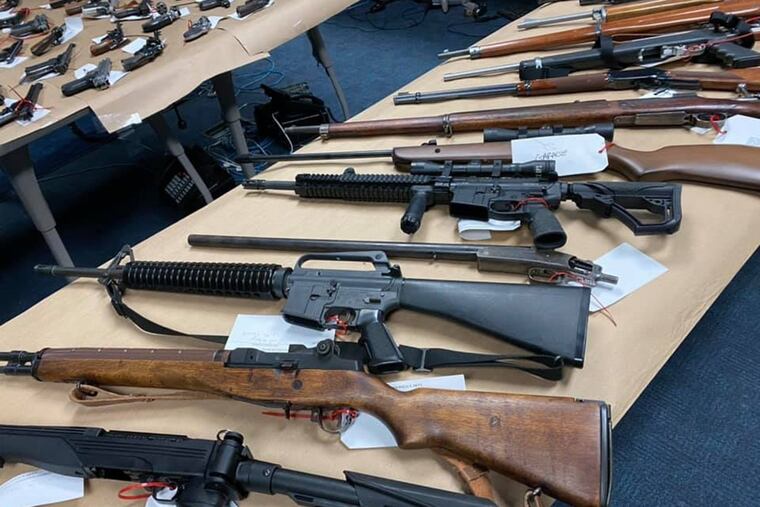High stress, loss of jobs, and quarantine: Social distancing poses unique threats to women and children | Editorial
The cocktail of social distancing, economic downturn, and abusive relationships is especially concerning in the U.S. where guns are in high availability.

Last month, a 38-year-old Lehigh Valley man shot his girlfriend and himself. Roderick Bliss did not survive his self inflicted gunshot wound, but the girlfriend did. She told the police that the coronavirus pandemic and a recent job loss had made him despondent.
The incident is a scenario that domestic-violence prevention advocates feared when social distancing measures were announced: high stress, loss of jobs, long hours together, and access to guns all colliding in tragedy. Women and children are often the main victims.
Like the pandemic itself, the resulting threat of domestic violence is global. In the United Kingdom, the largest domestic-violence agency reported a 700% increase in calls in a single day after lockdown took place. In Israel, domestic-violence incidents increased by 15%. Last week, Pope Francis prayed for women who “risk being subjected to violence because of a living situation in which they bear too great a burden.”
The cocktail of social distancing, economic downturn, and abusive relationships is especially concerning in the United States, where guns are easily available. The presence of a gun in the home makes it five times more likely that abuse will end in a killing. In Pennsylvania, gun stores are still open as “life-sustaining” businesses — even after the state’s Supreme Court ruled that Gov. Tom Wolf is allowed to close them.
» FAQ: Your coronavirus questions, answered
In Philadelphia, police records show that domestic-violence incidents — domestic rape and attempted rape, assaults, violation of protection-of-abuse orders, and child physical and sexual abuse — in the two weeks after Mayor Jim Kenney’s stay-at-home order were slightly lower than the two weeks prior. But both advocates and experts warn that the reason could be less reporting, not less violence and abuse. For example, immediately after Pennsylvania closed schools, the number of calls to the state’s child abuse hotline fell. The reason, advocates fear, is that children who are victims of abuse come in contact with fewer adults who could report, not that abuse stopped.
» READ MORE: Calls to Pa.’s child-abuse hotline fell sharply during first weeks of the coronavirus. Here’s why that’s bad news.
Women Against Abuse, a nonprofit domestic-violence advocacy and service provider, staffs the Philadelphia Domestic Violence Hotline on nights and weekends. In the week leading to the stay-at-home order, it experienced a 30% increase in call volume. Since then, the call volume has remained about 13% higher than last year.
Last April, a new Pennsylvania law allowed judges to order defendants in domestic abuse cases to relinquish their firearm within 24 hours. Enforcement of the ordinance starts with the Sheriff’s Office. Last December, The Inquirer found that in Philadelphia, defendants rarely complied — only 11% of guns were retrieved, the lowest rate in the region.
Sheriff Rochelle Bilal, who took office in January, pledged to make gun recovery a priority. As a good first step, she included the rate of weapon recovery as one of their performance measures in the mayor’s proposed Five Year Plan — and has set a target of 40% recovery rate in the next fiscal year. That will require work. In the first three months of 2020, according to the State Police’s statewide database of orders and guns recovered, only 45 defendants complied out of 457 ordered to relinquish guns — a 10% recovery rate. Bilal says her office is updating systems to allow for better tracking of orders, offenders, and guns that she says will lead to a higher retrieval rate.
» READ MORE: What’s the point in having gun control if Philadelphia doesn’t enforce it? | Editorial
While working to update systems, the Sheriff’s Office and the courts are stepping up in other ways to help the fight against domestic violence during COVID-19. Even though family court is generally closed, the court still issues protection-from-abuse orders — with an emergency site open 21 hours a day and an option to file over the phone. To reduce the burden on women, and allow them to social distance instead of going to a police station, the Sheriff’s Office has agreed to work with Women Against Abuse to serve orders.
It will take time to see the full toll of coronavirus on women and children in abusive settings. Creating new shelter options, such as in hotel rooms, that don’t force people to choose between abuse and COVID-19 and ramping up gun retrievals to ensure that abuse doesn’t turn fatal are the first steps.
For concerns about abuse, call the 24-hour Philadelphia domestic-violence hotline at 866-723-3014. For treatment for people who have acted harmfully, call Menergy at 215-242-2235.